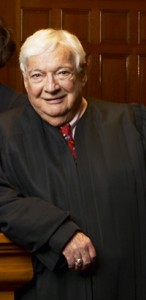Civility in the Courtroom
It seems like the more of a digital society we become, the less of a civil one we are. People are on their devices constantly — while wandering the grocery store, in the middle of a movie at a theater, during dinners. How many times have you seen a group of people out and noticed that all of them are on their phones? While the source of the problem is debatable (maybe phones and tables aren’t to blame), there can be no dispute that rudeness and incivility is on the rise. It is front and center in the national political discourse, and of course, Wisconsinites need only look as far as the Supreme Court or the Milwaukee County Sheriff to see first-hand examples.
But when I think about civility in the practice of law, it’s not the lawyers who are the problem; it’s the judiciary. I have never had opposing counsel question whether I was being candid, refer to me as intellectually dishonest, or tower over me and yell at me in the middle of hearing. All of those things have happened to me at the hands of members of the court. And how to deal with that is not something anyone ever teaches you in law school.
Judges do not have it easy. They have exploding caseloads and fewer and fewer dollars every year to deal with them. But at what point did the convenience of the court’s calendar start not just to overshadow the rights of the defendants and the needs of the victims and witnesses, but to completely consume it? Doing anything to disrupt the court’s calendar — whether it be by filing a motion requesting an evidentiary hearing, seeking an adjournment, or (gasp!) a defendant who actually exercises his right to a trial — causes a meltdown.
Recently, while waiting for my case to be called, I watched a judge grill a defendant at his final pretrial hearing about why he wanted a trial. “What is it you think your lawyer can do for you?” the judge asked, reminding the defendant that he had already confessed. But how does the judge know that? Because the state alleged it when the parties were discussing witnesses? There are lots of reasons people confess, if that is in fact what he did. And so what if he did confess; maybe his defense wasn’t that he didn’t do it, but that he was privileged to act in a particular way. I have no idea — I just saw a five-minute final pretrial hearing. But I was outraged that the defense attorney stood silent and let his client be questioned. The answer to the judge’s question is simple: the client wants a trial so he gets a trial. Why should never figure into it.
That sort of questioning has no place in a courtroom. It’s abhorrent. It’s unconstitutional. It’s uncivil.
Judges are under enormous pressure, but so is everyone else. A defendant exercising his rights by actively defending against the serious charges against him, should not be the cause of incivility. It should be celebrated.

